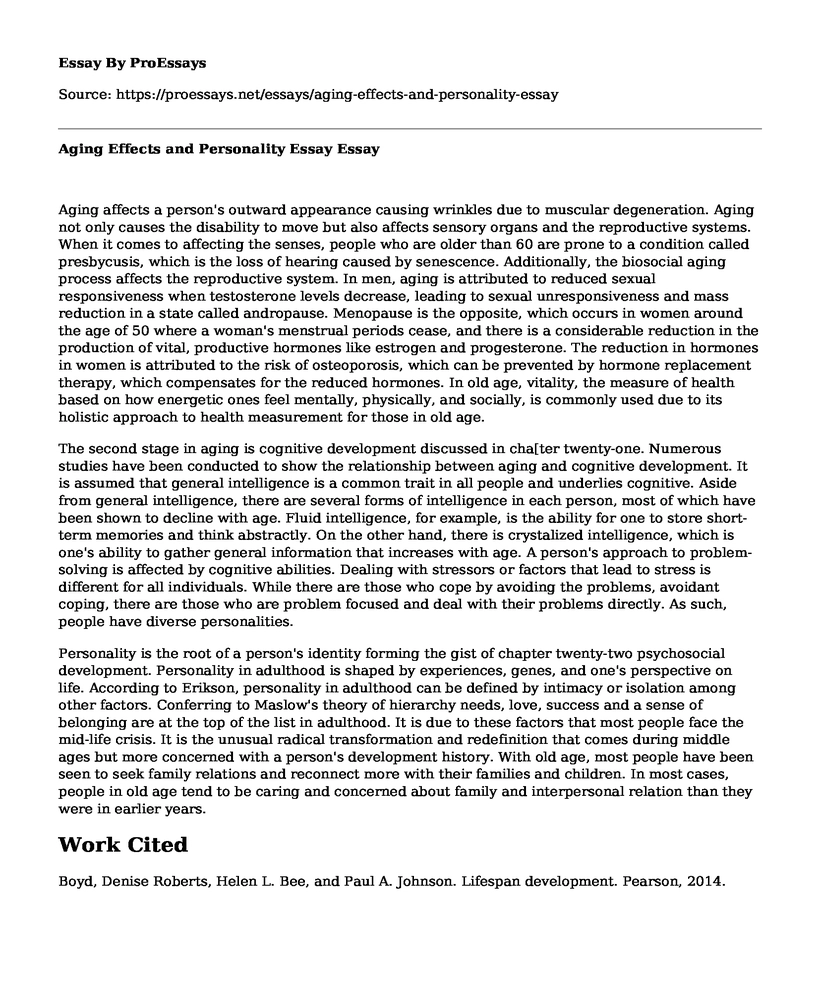Aging affects a person's outward appearance causing wrinkles due to muscular degeneration. Aging not only causes the disability to move but also affects sensory organs and the reproductive systems. When it comes to affecting the senses, people who are older than 60 are prone to a condition called presbycusis, which is the loss of hearing caused by senescence. Additionally, the biosocial aging process affects the reproductive system. In men, aging is attributed to reduced sexual responsiveness when testosterone levels decrease, leading to sexual unresponsiveness and mass reduction in a state called andropause. Menopause is the opposite, which occurs in women around the age of 50 where a woman's menstrual periods cease, and there is a considerable reduction in the production of vital, productive hormones like estrogen and progesterone. The reduction in hormones in women is attributed to the risk of osteoporosis, which can be prevented by hormone replacement therapy, which compensates for the reduced hormones. In old age, vitality, the measure of health based on how energetic ones feel mentally, physically, and socially, is commonly used due to its holistic approach to health measurement for those in old age.
The second stage in aging is cognitive development discussed in cha[ter twenty-one. Numerous studies have been conducted to show the relationship between aging and cognitive development. It is assumed that general intelligence is a common trait in all people and underlies cognitive. Aside from general intelligence, there are several forms of intelligence in each person, most of which have been shown to decline with age. Fluid intelligence, for example, is the ability for one to store short-term memories and think abstractly. On the other hand, there is crystalized intelligence, which is one's ability to gather general information that increases with age. A person's approach to problem-solving is affected by cognitive abilities. Dealing with stressors or factors that lead to stress is different for all individuals. While there are those who cope by avoiding the problems, avoidant coping, there are those who are problem focused and deal with their problems directly. As such, people have diverse personalities.
Personality is the root of a person's identity forming the gist of chapter twenty-two psychosocial development. Personality in adulthood is shaped by experiences, genes, and one's perspective on life. According to Erikson, personality in adulthood can be defined by intimacy or isolation among other factors. Conferring to Maslow's theory of hierarchy needs, love, success and a sense of belonging are at the top of the list in adulthood. It is due to these factors that most people face the mid-life crisis. It is the unusual radical transformation and redefinition that comes during middle ages but more concerned with a person's development history. With old age, most people have been seen to seek family relations and reconnect more with their families and children. In most cases, people in old age tend to be caring and concerned about family and interpersonal relation than they were in earlier years.
Work Cited
Boyd, Denise Roberts, Helen L. Bee, and Paul A. Johnson. Lifespan development. Pearson, 2014.
Cite this page
Aging Effects and Personality Essay. (2022, May 09). Retrieved from https://proessays.net/essays/aging-effects-and-personality-essay
If you are the original author of this essay and no longer wish to have it published on the ProEssays website, please click below to request its removal:
- Our Relationship With the Environment Essay Example
- The Effectiveness of Group Therapy on Self-Esteem of Teenage Girls - Essay Sample
- Literature Review on Growth vs. Fixed Mindset
- Essay Example on Jane: A Life of Love and Loss
- Essay Example on Psychopaths: Impact on Criminal Justice Systems
- Unwind: Exploring Different Stress-Relief Practices Around the Globe - Essay Sample
- Essay Example on Navigating Social Norms in Early Adulthood: A Journey towards Growth and Expansion







